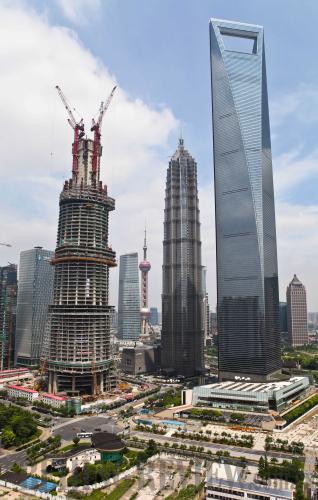|
 |
|
NEW HEIGHTS FOR FINANCE: A skyscraper is under construction in Lujiazui, Shanghai's financial center. China continues to expand its financial sector (NIU YIXIN) |
After 30 years of reform and opening up, China's economic aggregate has risen to the world's second largest—an incredible accomplishment given that it was once below 100th place. Today, the country wields significant influence on the global economy. However, economic problems in China persist, including an unbalanced economic structure, an unequal distribution of social wealth and inadequate growth in the past year. The public has grown concerned about sustainable economic growth, and some economists have even called for new economic reforms.
What kind of reform does China need to ensure sustainable economic development?
On September 15-19, more than 120 economists took part in a conference in Deqing County's Mogan Mountain, Zhejiang Province, to discuss the path, focal points and difficulties of China's next round of reform and opening up. Topics included reform theories and macro-economics, institutional reform and income distribution, urbanization and land system, as well as globalization.
Li Luoli, Vice President of the China Society of Economic Reform (CSER), says the country's reform effort is at a crucial moment. Future reform will be very difficult and complex, and the path of reform today is quite different from that of 20 years ago.
"Reform focused on economic reform, but now we need reforms in a variety of aspects. Different interest groups have been formed to address social issues. At present, minor reform may lead to major consequences. Reform measures supported by some people may be resisted and objected by others, making reform very difficult for the present time," Li said.
Peng Sen, former Vice Chairman of the National Development and Reform Commission, said at the conference that China must appropriately handle four kinds of relationships for future reform, namely, the relationship between the government and the market, between the Central Government and various local governments, between urban and rural areas, and between economic growth and social development.
Future directions
There are various opinions on economic reform. Some scholars wish China would moderately return to a planned economy, while others hope the country further expands privatization. At the conference, participants reached a consensus on future reform: China must adhere to market-oriented principles; the state-owned economy must continue to be an economic mainstay; and there must be a break in administrative monopolies.
Gao Shangquan, Honorary President of the CSER, says the goals for China's economic reform are to set up a socialist market economy, allocate resources through the market and transfer from a planned economy to a socialist market economy. Therefore, the rules of the market economy must be abided by—they should not be broken in the name of socialism.
In regards to expanding privatization, Gao advises against doing so and believes the economy should continue to be guided by the government. The government's presence in the economy should not be a reason for reform. In the early 1970s, a great portion of some developed countries' economies were also state-run: 29 percent in Britain, 33 percent in France, 30 percent in Italy and 30 percent in the Federal Republic of Germany. In Japan, the proportion reached 35 percent in the early 1980s. No one branded those countries socialist economies at that time. In Viet Nam, the government's hand in the economy is much smaller than in China, but no one denies it is a socialist country.
However, Gao said the government should reduce its presence in micro-economic-related activities. Many departments and local governments continue to intervene in areas such as the production and operation of monopolistic industries and even market-oriented competitive industries. Such abuse of administrative power has provided soil for corruption, intensified income inequality and impaired the credibility of the government.
|
